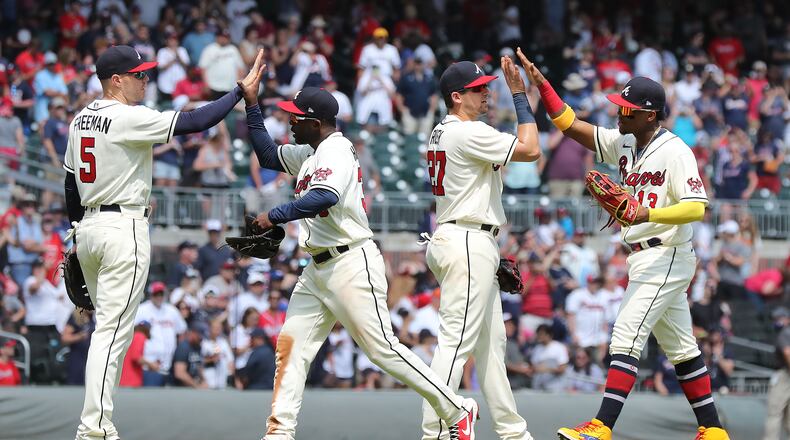Thirteen of the Braves’ next 16 games will take place against National League East opponents, the other three against the defending World Series champion.
It’s a stretch of the schedule, starting Memorial Day weekend, that could begin to define a team that has been at or narrowly below .500 for two months. And the Braves will enter it minus left fielder Marcell Ozuna, who will miss at least the next six weeks after breaking two fingers sliding into third base.
“This is what it’s all about,” Braves manager Brian Snitker said of the stretch ahead. “You want to get into those games because if you’re going to win the division you’re going to have to go through things like that. We’ve done it before, and I’m looking forward to it.”
The Braves on Friday night will open a three-game series in New York against the Mets, who lead the NL East by 2-1/2 games over the Braves and Phillies, tied for second place. The Mets have two-time Cy Young Award winner Jacob deGrom, who hasn’t allowed more than one run nor more than five hits in any of his seven starts this season, scheduled to pitch the series finale Sunday night.
Over the next 17 days, the Braves also will face the three other NL East teams: a four-game series Monday through Thursday against Washington at Truist Park, a three-game series June 8-10 at Philadelphia and a three-game series June 11-13 at Miami.
The Braves’ only interruption from divisional play amid that stretch will be a three-game series June 4-6 at Truist Park against the reigning World Series champion Los Angeles Dodgers.
Contrary to preseason brags about the strength of the NL East, only one team in the division has a winning record, the Mets at 24-20. But the five teams are separated by only 3-1/2 games in the standings from top to bottom (entering Thursday night), making it baseball’s most competitive, if not best, division. Head-to-head matchups provide an opportunity for someone to elevate themselves – or for the teams to beat up on one another and remain jumbled.
Friday night’s game will be the Braves’ 50th of the season, and they surprisingly arrive at that milepost without having had a winning record at any point this year.
They’ve been at break-even on four occasions: 4-4, 12-12, 17-17 and, most recently, 24-24 after a win at Boston on Tuesday. But each time they reached .500, the Braves lost the next one, including Wednesday’s 9-5 defeat to the Red Sox in a game that endured an almost three-hour rain delay, ended at 12:59 a.m. and sent the Braves to New York with a 24-25 record.
The Braves also carry the issue of how to replace Ozuna, who they learned Wednesday will be sidelined until after the All-Star break, or thereabouts, because of the hand injury sustained in Tuesday’s game. Although Ozuna has struggled at the plate this season, hitting .213, he led the National League in home runs and RBIs last year while hitting .338. Now he joins starting catcher Travis d’Arnaud and starting pitchers Mike Soroka and Huascar Ynoa on the Braves’ injured list.
Snitker said the Braves will consider players at Triple-A Gwinnett, as well as possible external options, to fill Ozuna’s spot on the roster. They’ll make a move of some sort before Friday night’s game.
“In baseball, there’s no time to (bemoan injuries),” Braves pitcher Drew Smyly said. “Nobody is going to feel sorry for you.”
The Braves certainly won’t get sympathy from the Mets, who have a mind-boggling 17 players on the injured list.
Ultimately, the team that navigates injuries best might win the NL East, given the epidemic of ailments around MLB this season.
“Every day, there’s more and more guys with (injuries) -- obliques, sides, hamstrings, knees,” Snitker said. “It’s been something else. I would have expected it to be more like this last year, with the ramped-up start we had. This year, we had a full spring training, the weather was good, everybody got all their work in on all the teams. I don’t know if the shortened season last year has more of an impact (this year) than we ever thought it could, or what. I can’t explain it.”
About the Author
Keep Reading
The Latest
Featured


